

OpenID. OpenID is an open standard and decentralized authentication protocol.
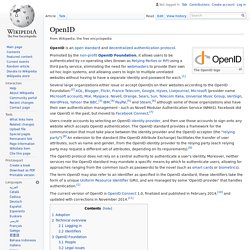
Promoted by the non-profit OpenID Foundation, it allows users to be authenticated by co-operating sites (known as Relying Parties or RP) using a third party service, eliminating the need for webmasters to provide their own ad hoc login systems, and allowing users to login to multiple unrelated websites without having to have a separate identity and password for each.[1] Users create accounts by selecting an OpenID identity provider, and then use those accounts to sign onto any website which accepts OpenID authentication. The OpenID protocol does not rely on a central authority to authenticate a user's identity. Moreover, neither services nor the OpenID standard may mandate a specific means by which to authenticate users, allowing for approaches ranging from the common (such as passwords) to the novel (such as smart cards or biometrics).
Adoption[edit] Technical overview[edit] Logging in[edit] Identifiers[edit] People[edit] PROTECT-IP Letter, Final. How to enable Private Listening on Spotify. We all have two or three playlists on Spotify we would prefer our listening habits of be left private.
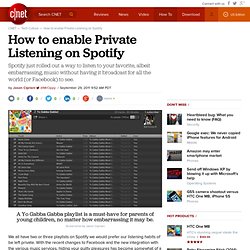
With the recent changes to Facebook and the new integration with the various music services, hiding your guilty pleasures has become somewhat of a hassle. Up until now, the only available solution to prevent your music selection from being displayed on Facebook is somewhat permanent. Thankfully, Spotify has rolled out a Private Listening feature to its desktop clients, allowing users to temporarily stop their music selection from being broadcast all over the Internet. To enable Private Listening in Spotify on a Mac, go to your Menu Bar, click on Spotify, and select Private Listening.
If you are using Windows you can go to File > Private Browsing. How easy is that? Five things to know before using Facebook Timeline apps. Facebook finally unveiled a host of apps this evening that, coupled with Timeline profiles, will bring an entirely new experience to its users.
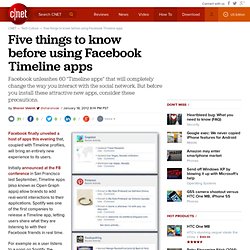
Initially announced at the F8 conference in San Francisco last September, Timeline apps (also known as Open Graph apps) allow brands to add real-world interactions to their applications. Spotify was one of the first companies to release a Timeline app, letting users share what they are listening to with their Facebook friends in real time. For example as a user listens to a song on Spotify, the activity appears as, "Jane Doe is listening to July by Youth Lagoon on Spotify" on Facebook. With tonight's announcement of more than 60 new Timeline apps, users can expect to see more actions beyond listening, like "reading," "watching," "cooking," and "running". But before you add these attractive new apps, consider the way Open Graph works and how exactly it will affect your Facebook experience. 1. 2. 3. 4.
U.S. seizes sites linked to copyright infringement. The U.S. government has launched a major crackdown on online copyright infringement, seizing dozens of Web site domains linked to illegal file sharing and counterfeit goods.
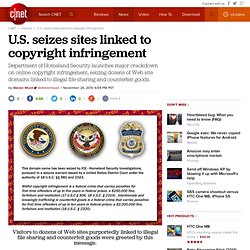
The domains of torrent sites that link to illegal copies of music and movie files and sites that sell counterfeit goods were seized this week by the Immigration and Customs Enforcement division of the Department of Homeland Security. Visitors to such sites as Torrent-finder.com, 2009jerseys.com, and Dvdcollects.com found that their usual sites had been replaced by a message that said, "This domain name has been seized by ICE--Homeland Security Investigations, pursuant to a seizure warrant issued by a United States District Court.
" One domain owner said he was surprised by the action. "My domain has been seized without any previous complaint or notice from any court! " the owner of Torrent-Finder told TorrentFreak, which listed more than 70 domains that were apparently part of the massive seizure. Five essential changes to Protect IP Act. The Senate's controversial Protect IP Act, which would significantly expand both public and private enforcement of online copyright and trademark infringement, is returning to center stage.
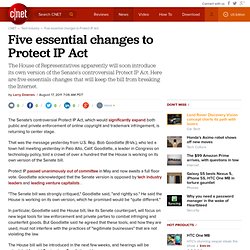
That was the message yesterday from U.S. Rep. Bob Goodlatte (R-Va.), who led a town hall meeting yesterday in Palo Alto, Calif. Goodlatte, a leader in Congress on technology policy, told a crowd of over a hundred that the House is working on its own version of the Senate bill. Protect IP passed unanimously out of committee in May and now awaits a full floor vote.